Ford Bronco vs Jeep Compass - Differences and prices compared
Costs and Efficiency:
Looking at overall running costs, both models reveal some interesting differences in everyday economy.
Jeep Compass has a convincingly advantage in terms of price – it starts at 34200 £, while the Ford Bronco costs 58200 £. That’s a price difference of around 24042 £.
Fuel consumption also shows a difference: Jeep Compass manages with 5.80 L and is therefore significantly more efficient than the Ford Bronco with 11.30 L. The difference is about 5.50 L per 100 km.
Engine and Performance:
Under the bonnet, it becomes clear which model is tuned for sportiness and which one takes the lead when you hit the accelerator.
When it comes to engine power, the Ford Bronco has a clearly perceptible edge – offering 335 HP compared to 213 HP. That’s roughly 122 HP more horsepower.
In acceleration from 0 to 100 km/h, the Ford Bronco is noticeable quicker – completing the sprint in 6.70 s, while the Jeep Compass takes 8.50 s. That’s about 1.80 s faster.
In terms of top speed, the Jeep Compass performs somewhat better – reaching 188 km/h, while the Ford Bronco tops out at 161 km/h. The difference is around 27 km/h.
There’s also a difference in torque: Ford Bronco pulls clearly perceptible stronger with 563 Nm compared to 345 Nm. That’s about 218 Nm difference.
Space and Everyday Use:
Beyond pure performance, interior space and usability matter most in daily life. This is where you see which car is more practical and versatile.
Seats: offers more seating capacity – vs .
In curb weight, Jeep Compass is clearly perceptible lighter – 1667 kg compared to 2289 kg. The difference is around 622 kg.
In terms of boot space, the Ford Bronco offers barely noticeable more room – 562 L compared to 550 L. That’s a difference of about 12 L.
In maximum load capacity, the Ford Bronco performs a bit better – up to 1804 L, which is about 243 L more than the Jeep Compass.
Who comes out on top?
Overall, the Jeep Compass shows itself to be leads convincingly overall and secures the title of DriveDuel Champion.
It convinces with the more balanced overall package and proves to be the more versatile choice for everyday use.
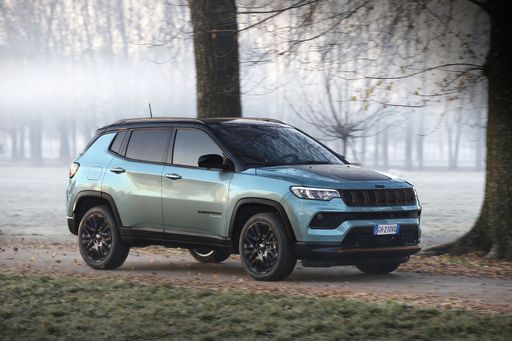 @ Jeep / Stellantis Media
@ Jeep / Stellantis Media
Jeep Compass
Costs and Consumption
View detailed analysis
Engine and Performance
View detailed analysis
Dimensions and Body
View detailed analysis
Ford Bronco
The Ford Bronco is a go-anywhere SUV that wraps rugged off-road capability in retro looks and modern tech, promising weekend warriors a grin from first mud splash to last campfire. With removable roofs and doors, a surprisingly polished cabin for everyday life and a wide range of trims, it’s as happy tackling trails as it is turning heads on the school run — adventure with attitude.
details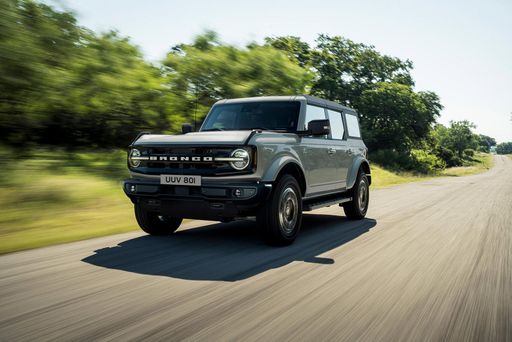 @ Ford Motor Company / Ford Media Center
@ Ford Motor Company / Ford Media Center
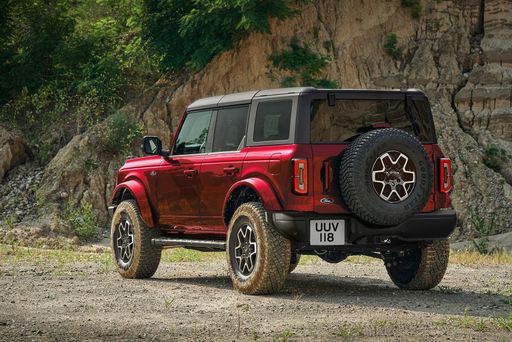 @ Ford Motor Company / Ford Media Center
@ Ford Motor Company / Ford Media Center
 @ Ford Motor Company / Ford Media Center
@ Ford Motor Company / Ford Media Center
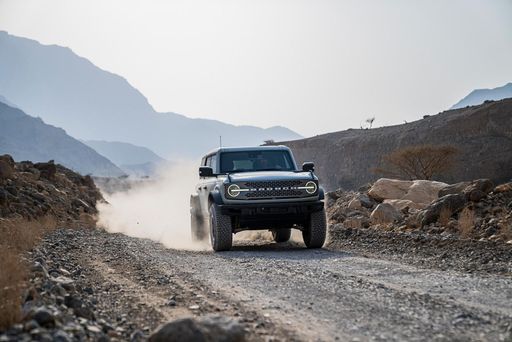 @ Ford Motor Company / Ford Media Center
@ Ford Motor Company / Ford Media Center
 @ Ford Motor Company / Ford Media Center
@ Ford Motor Company / Ford Media Center
Jeep Compass
The Jeep Compass packs classic Jeep styling with a surprisingly composed demeanor, equally at home turning heads in the city or tackling a weekend dirt track. Inside it's a pragmatic, user-friendly compact SUV that prioritizes comfort and versatility — a smart pick if you want a dose of adventure without giving up everyday sense.
details @ Jeep / Stellantis Media
@ Jeep / Stellantis Media
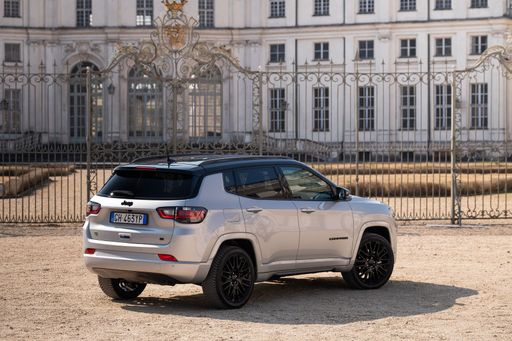 @ Jeep / Stellantis Media
@ Jeep / Stellantis Media
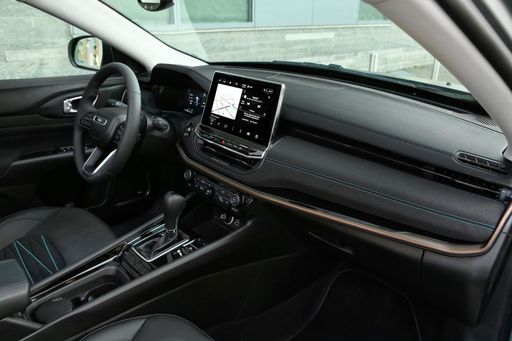 @ Jeep / Stellantis Media
@ Jeep / Stellantis Media
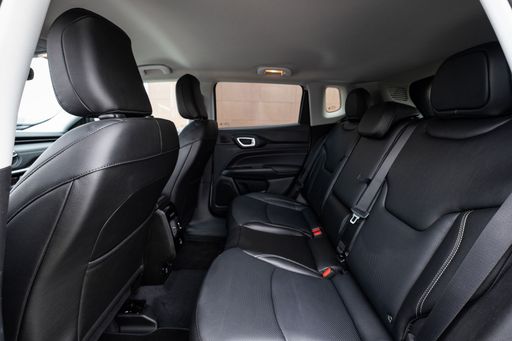 @ Jeep / Stellantis Media
@ Jeep / Stellantis Media
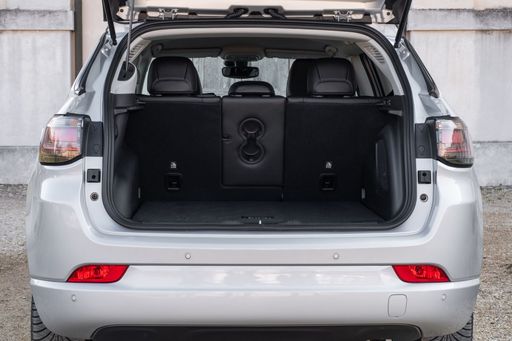 @ Jeep / Stellantis Media
@ Jeep / Stellantis Media
 @ Ford Motor Company / Ford Media Center
@ Ford Motor Company / Ford Media Center
|
 @ Jeep / Stellantis Media
@ Jeep / Stellantis Media
|
|
|
|
Costs and Consumption |
|
|---|---|
|
Price
58200 - 60000 £
|
Price
34200 - 43200 £
|
|
Consumption L/100km
11.3 - 12.7 L
|
Consumption L/100km
5.8 - 5.9 L
|
|
Consumption kWh/100km
-
|
Consumption kWh/100km
17.50 kWh
|
|
Electric Range
-
|
Electric Range
500 km
|
|
Battery Capacity
-
|
Battery Capacity
74 kWh
|
|
co2
257 - 288 g/km
|
co2
0 - 133 g/km
|
|
Fuel tank capacity
79 L
|
Fuel tank capacity
55 L
|
Dimensions and Body |
|
|---|---|
|
Body Type
Off-Roader
|
Body Type
SUV
|
|
Seats
5
|
Seats
5
|
|
Doors
5
|
Doors
5
|
|
Curb weight
2289 - 2418 kg
|
Curb weight
1667 - 2198 kg
|
|
Trunk capacity
504 - 562 L
|
Trunk capacity
550 L
|
|
Length
4800 - 4811 mm
|
Length
4552 mm
|
|
Width
1928 - 1937 mm
|
Width
1928 mm
|
|
Height
1938 - 1962 mm
|
Height
1675 mm
|
|
Max trunk capacity
1780 - 1804 L
|
Max trunk capacity
1561 L
|
|
Payload
387 - 411 kg
|
Payload
-
|
Engine and Performance |
|
|---|---|
|
Engine Type
Petrol
|
Engine Type
Petrol MHEV, Electric
|
|
Transmission
Automatic
|
Transmission
Automatic
|
|
Transmission Detail
Automatic Gearbox
|
Transmission Detail
Dual-Clutch Automatic, Reduction Gearbox
|
|
Drive Type
All-Wheel Drive
|
Drive Type
Front-Wheel Drive
|
|
Power HP
335 HP
|
Power HP
145 - 213 HP
|
|
Acceleration 0-100km/h
6.7 - 7.2 s
|
Acceleration 0-100km/h
8.5 - 10.3 s
|
|
Max Speed
161 km/h
|
Max Speed
180 - 188 km/h
|
|
Torque
563 Nm
|
Torque
230 - 345 Nm
|
|
Number of Cylinders
6
|
Number of Cylinders
3 - 4
|
|
Power kW
246 kW
|
Power kW
107 - 157 kW
|
|
Engine capacity
2694 cm3
|
Engine capacity
1199 cm3
|
General |
|
|---|---|
|
Model Year
2023
|
Model Year
2025
|
|
CO2 Efficiency Class
G
|
CO2 Efficiency Class
D, A
|
|
Brand
Ford
|
Brand
Jeep
|
What drivetrain options does the Ford Bronco have?
The Ford Bronco is offered with All-Wheel Drive.
The prices and data displayed are estimates based on German list prices and may vary by country. This information is not legally binding.
